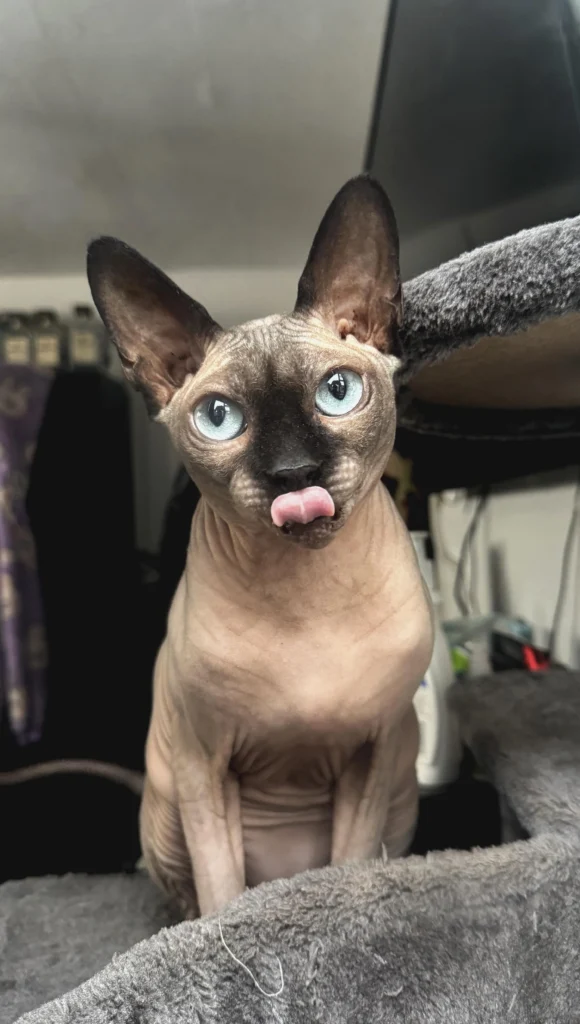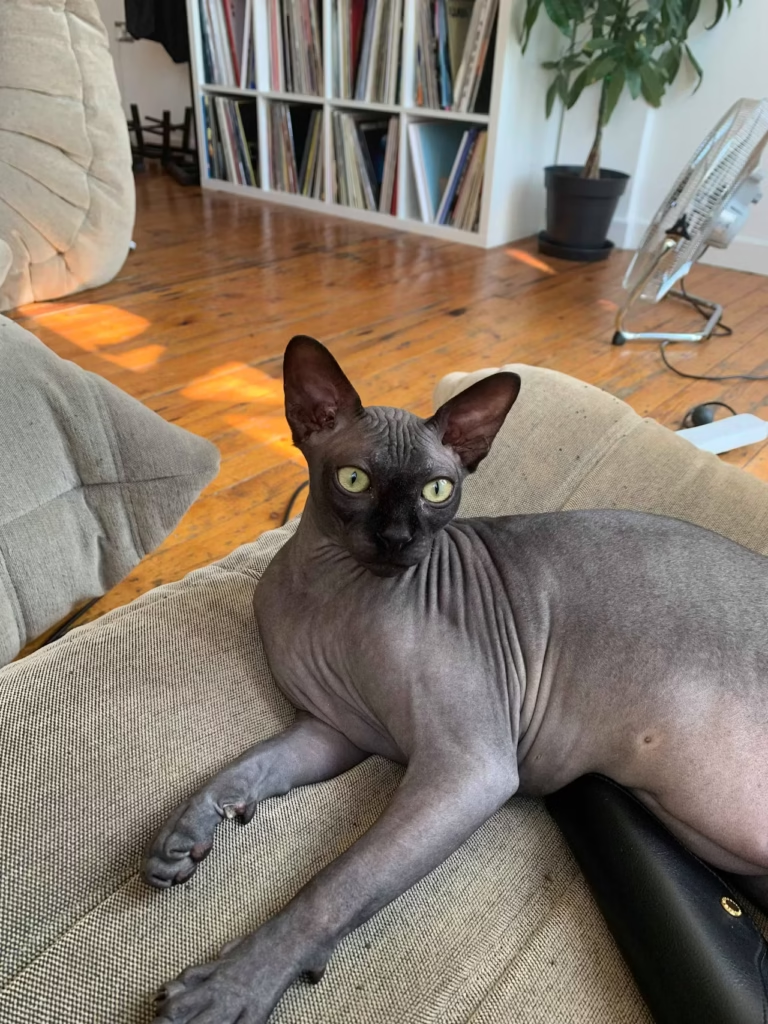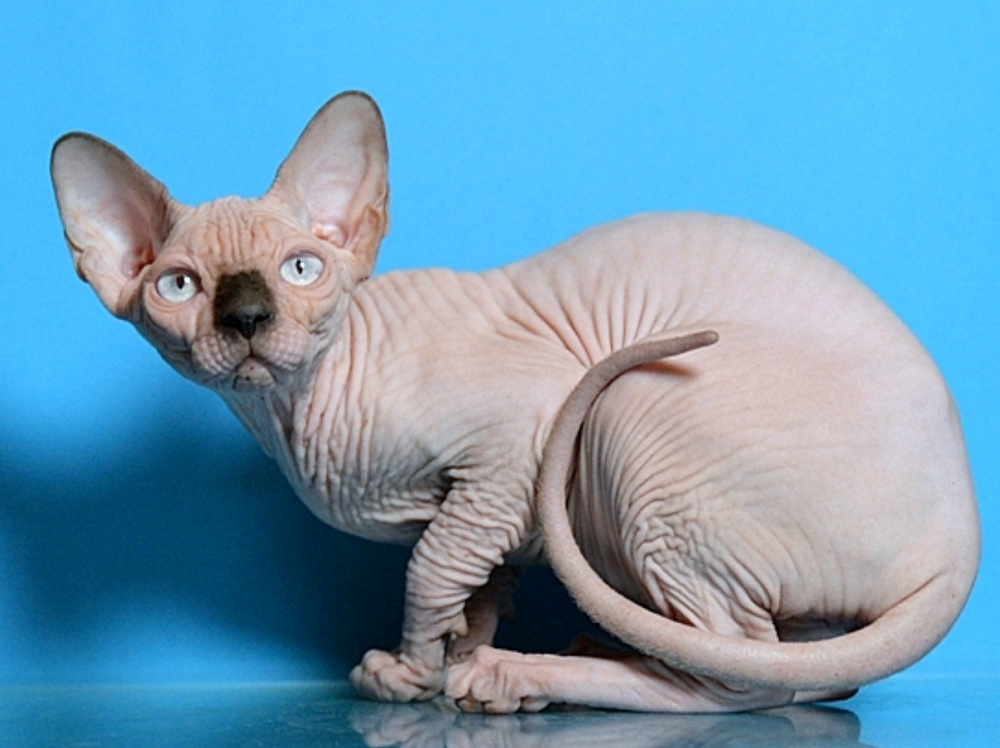Sphynx
The Sphynx cat is renowned for its striking appearance, most notably its lack of fur. Unlike traditional feline breeds, the Sphynx boasts a hairless coat that is a result of a natural genetic mutation. This unique characteristic sets it apart and captures the interest of cat aficionados. The skin of a Sphynx is not simply devoid of hair; it has a distinct texture that can feel warm and velvety to the touch. Many owners often describe the sensation as akin to touching a peach or the surface of a warm loaf of bread, which adds to the breed’s allure.

Additionally, the Sphynx exhibits prominent features that further enhance its exotic charm. Its large, bat-like ears are wide-set and often appear bigger in proportion to its head, contributing to its distinctive silhouette. Furthermore, the Sphynx has pronounced cheekbones and a strong chin, giving it a unique and captivating profile. These features, when combined with its muscular build and athletic stance, create an impressively bold aesthetic.
In terms of coloration and patterns, Sphynx cats offer a diverse array of options. They can appear in various shades, including the more common colors such as white, black, blue, and cream, along with rare variations like lavender and cinnamon. Moreover, Sphynx cats can feature intriguing patterns, including solid colors, point coloration akin to Siamese cats, and combinations of these with patterns such as tabby or tortoiseshell. Despite the absence of fur, unique skin patterns or markings can also be observed, providing a fascinating twist to their already extraordinary appearance. This remarkable visual variety is a key reason why the Sphynx has garnered a loyal following among cat lovers worldwide.

Personality
The Sphynx cat is renowned for its captivating and warm-hearted personality, making it an engaging companion for many households. One of the most distinctive traits of this breed is its affectionate nature. Sphynx cats thrive on human interaction, often forming deep bonds with their owners and showing loyalty that is both rare and endearing. They enjoy being at the center of household activities and are known to follow their family members around, eager to be included in every aspect of daily life.
Playfulness is another hallmark of the Sphynx’s temperament. These cats are highly energetic and require ample stimulation, which can be provided through interactive toys, games, or even simple household items. Their enthusiastic disposition means they often engage in captivating antics that delight both children and adults. Owners should be prepared for an active pet that may require regular playtime to achieve a healthy outlet for their abundant energy.
The Sphynx’s sociable nature allows it to adapt easily to various living environments. Whether in spacious homes or smaller apartments, this breed loves to interact with people and other pets. Their friendly demeanor also makes them receptive to meeting new friends, both feline and canine. However, potential owners should note that the Sphynx may exhibit behavioral quirks, such as being more sensitive to temperature changes due to their lack of fur, which can affect their mood.
Ultimately, the Sphynx cat offers companionship that is filled with affection and loyalty. Its playful and adaptable personality can seamlessly integrate into diverse family dynamics, creating lifelong bonds and heartwarming memories. Understanding these personality traits will help potential owners provide the best environment for their Sphynx, ensuring a fulfilling relationship between cat and owner.
Origins
The Sphynx cat, renowned for its unique hairless appearance, has an intriguing history that traces back to ancient civilizations. While the breed is often associated with Egypt due to its name, the true origins of hairless cats can be linked to various regions. Historical texts suggest that similar cats existed in ancient Egypt, where they were revered and associated with the goddess Bastet, symbolizing protection and motherhood. The connection to Egyptian mythology has contributed to the Sphynx cat’s mystique, captivating feline enthusiasts globally.

In the mid-1960s, breeders in Canada began to take a keen interest in hairless kittens that appeared in domestic litters. These genetic mutations were not entirely new, as hairless cats have been documented throughout history. This discovery led to the formalization of the breed, particularly through selective breeding practices aimed at enhancing its distinct characteristics. The purposeful breeding produced Sphynx cats with a unique set of traits, including their prominent cheekbones, muscular build, and the absence of fur.
As the breed developed, it became clear that the Sphynx cat was much more than a curiosity. Its endearing personality traits, including playfulness and sociability, made it a desirable companion. The genetic background of the Sphynx cat presents a fascinating mix of various breeds, including the Devon Rex and the American Shorthair, which contributed to its physical features and temperament. Today, the Sphynx cat is recognized by numerous cat registries worldwide and has gained substantial popularity as a beloved pet.
Care of the Sphynx cat
The Sphynx cat, renowned for its unique hairless appearance, requires specific care and attention to ensure optimum health and well-being. Grooming needs are noticeably different compared to traditional feline breeds. Despite the absence of fur, Sphynx cats still produce oils that accumulate on their skin. It is essential to bathe them regularly, typically every one to two weeks, using a gentle, hypoallergenic cat shampoo. This practice helps prevent skin issues and maintains their skin’s health, as it removes excess oils and dirt.
Diet plays a crucial role in the well-being of Sphynx cats. A balanced, high-quality diet tailored to their age, weight, and health status is paramount. Due to their unique metabolism, Sphynx cats may require more calories than other breeds to maintain their body temperature. It is advisable to feed them premium quality cat food that is rich in protein and essential nutrients. Consulting a veterinarian for personalized dietary recommendations is a prudent approach to ensure that they receive adequate nourishment.
Exercise is another critical factor in maintaining a healthy Sphynx cat. These cats are known for their playful and energetic nature. Engaging them in interactive play with toys, climbing structures, or even activities like fetching can help keep them physically and mentally stimulated. Regular playtime not only aids in muscle development but also helps alleviate potential behavioral issues stemming from boredom.
Like all breeds, Sphynx cats are prone to certain health concerns. Common issues include skin infections, ear infections, and dental problems. Due to their lack of fur, they are also more sensitive to temperature changes and must be kept in a warm environment. Regular veterinary check-ups are critical to monitor their health and address any emerging concerns promptly. By adhering to these care recommendations, owners can significantly contribute to their Sphynx cat’s overall health and happiness.
Health
The Sphynx cat is a unique hairless breed known for its affectionate nature but requires special health care. Due to their lack of fur, they are prone to skin issues, temperature sensitivity, and sunburn. Regular bathing helps prevent oil buildup, while a balanced diet supports their high metabolism. Common health concerns include hypertrophic cardiomyopathy (HCM) and respiratory infections. Routine vet checkups and proper skincare ensure a healthy, happy Sphynx cat.
Nutrition
The Sphynx cat requires a high-protein, nutrient-rich diet to support its fast metabolism and maintain skin health. Due to their lack of fur, they burn more calories to regulate body temperature. A balanced diet with quality animal protein, healthy fats, and essential vitamins is key. Hydration is also crucial, so wet food or fresh water should always be available. Avoid fillers and low-quality ingredients to prevent digestive issues.
Cleanliness
The Sphynx cat, known for its hairless coat, requires regular grooming despite its lack of fur. Its skin accumulates oils and dirt, necessitating frequent baths to prevent buildup. Regular ear cleaning and nail trimming are also essential for maintaining hygiene. Unlike furry breeds, the Sphynx doesn’t shed, making it a cleaner option for allergy sufferers. Proper skincare ensures a healthy, odor-free pet.
Best cat breeds for kids
The Sphynx cat is a loving, playful, and affectionate breed, making it one of the best cat breeds for kids. Known for its hairless appearance and friendly personality, the Sphynx thrives on human interaction and enjoys cuddling. Their social and gentle nature makes them a great companion for children, while their low-allergen coat reduces shedding. If you’re looking for a kid-friendly cat with a unique look and a big heart, the Sphynx is a perfect choice!
People who have seen this breed have also visited…
In this section you can find completely detailed information about the breed of your cat.
